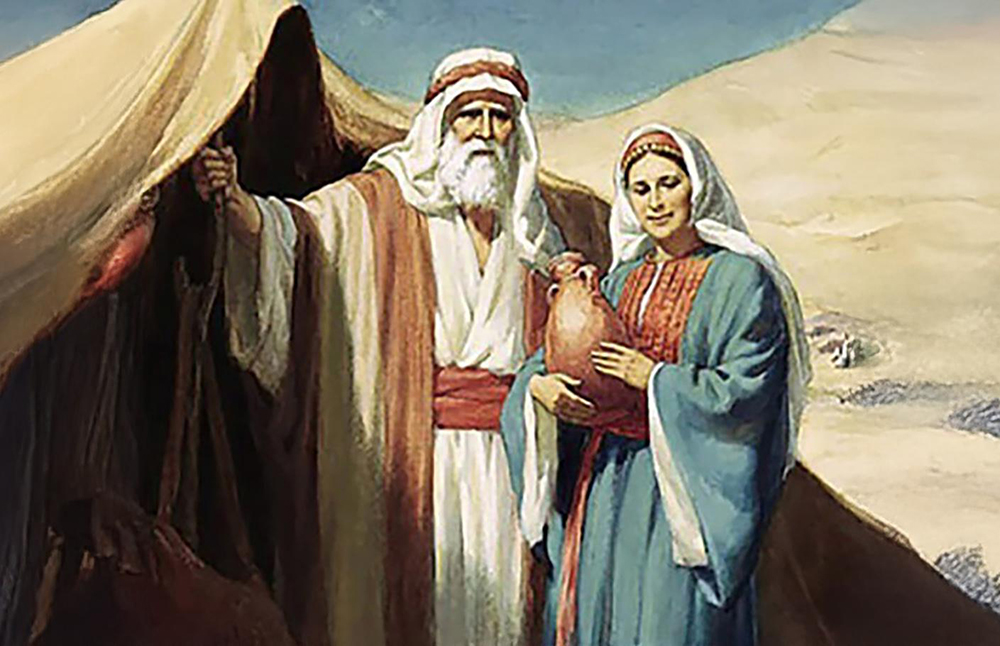|
Getting your Trinity Audio player ready...
|
By: Rabbi Osher Jungreis
In this week’s parsha, the history of the Jewish people commences. Until now, in the portions of Genesis and Noah, we studied about the creation of the world and the development of mankind, but now we meet the first Jewish couple–our grandparents, Abraham and Sarah.
The Torah goes into great detail regarding the fine nuances of their lives, for it is written, “Ma’aseh Avot, Siman L’Banim”–“Whatever happened to the forefathers, is a sign for the children. Therefore, by studying the lives of our patriarchs and matriarchs, we can better appreciate the meaning of our own lives.
Our father Abraham was challenged with ten tests, all of which he passed with great distinction. All of the trials and tribulations of future generations are traceable to those tests. If, through our long painful history we remained faithful to G-d and never lost sight of our calling, it is because Abraham created the character traits that enabled us to prevail.
The very first test with which he is confronted is in the opening verse of our parsha: “Lech Lecha”–“Go for yourself”, meaning, divorce yourself from the immoral ways of the world, tap your inner resources, and discover your mission, your higher purpose in life. If necessary, be the lone voice standing up against the world, but stand steadfast in your commitment to Torah…do not compromise!
Our sages teach that when Abraham was being tested, he was not given Divine assistance, but had to seek strength from within. This appears rather paradoxical; does not G-d help us fulfill every mitzvah? Isn’t His guiding hand always there?
But if a test is to be truly a test that will accomplish its goal, then G-d has to restrain Himself from helping us, even as a parent or teacher has to refrain from providing the answers and encourage his children or students to research, study, and probe.
Therefore, G-d denied Abraham assistance so that he might unearth the treasures buried within him and create those immortal character traits that would enable his descendants to survive for all time.
Thus, because Abraham was able to pass that first test and “depart from his country, from his birthplace, from his father’s house”, we too have been able to adapt to those new lands to which destiny has led us. Because Abraham was able to retain his faith in face of famine and the terrible ordeal of Sarah’s abduction, we too have been able to retain our faith in days of total darkness, when all appears lost. Thus, every test that Abraham passed has become part of our spiritual genes. So when confronted by life’s many trials and tribulations, we are not to despair. We have what it takes–our father Abraham prepared us well. We need only summon our energies, our inner reserves and we will pass the test and triumph.
G-d tells Abraham, “He’yeh bracha”–“You shall be a blessing.” It doesn’t say “You shall be blessed, but you shall be a blessing, teaching us that the greatest gift to which we can aspire is to be a blessing to others, to be able to make a difference in their lives, and if we can do that, we will indeed be blessed.
Abraham transformed life`s problems into windows of opportunity, and from each trial he emerged stronger and greater, until he became the spiritual giant that he was destined to become.
My dearly beloved father, Rabbi Meshulem HaLevi Jungreis, Z`tl, would often say that the difference between bitter and better is just one letter. So too, in life, everything depends on attitude. One little letter can change everything. The way we react to onerous, trying times will either make us better or bitter. This message is especially significant to us today as we are beset by so many unknowns, so many fears. Let us convert our anxieties into challenges for growth. Let us become better and not bitter. This teaching should guide us in every aspect of our lives. Should the challenge be major or minor, big or small, the image of our father Abraham should remind us to seize the opportunity to make that which is bitter, better.
King Solomon, the wisest of all men taught, “It is better to go to a house of mourning than to a house of feasting (Ecclesiastes 7:2), meaning that in a house of mourning, we come to appreciate the preciousness and the impermanence of life. We learn to prioritize and focus on that which has meaning: a good name, acts of loving-kindness, family, and above all, our relationship with our Heavenly Father.




